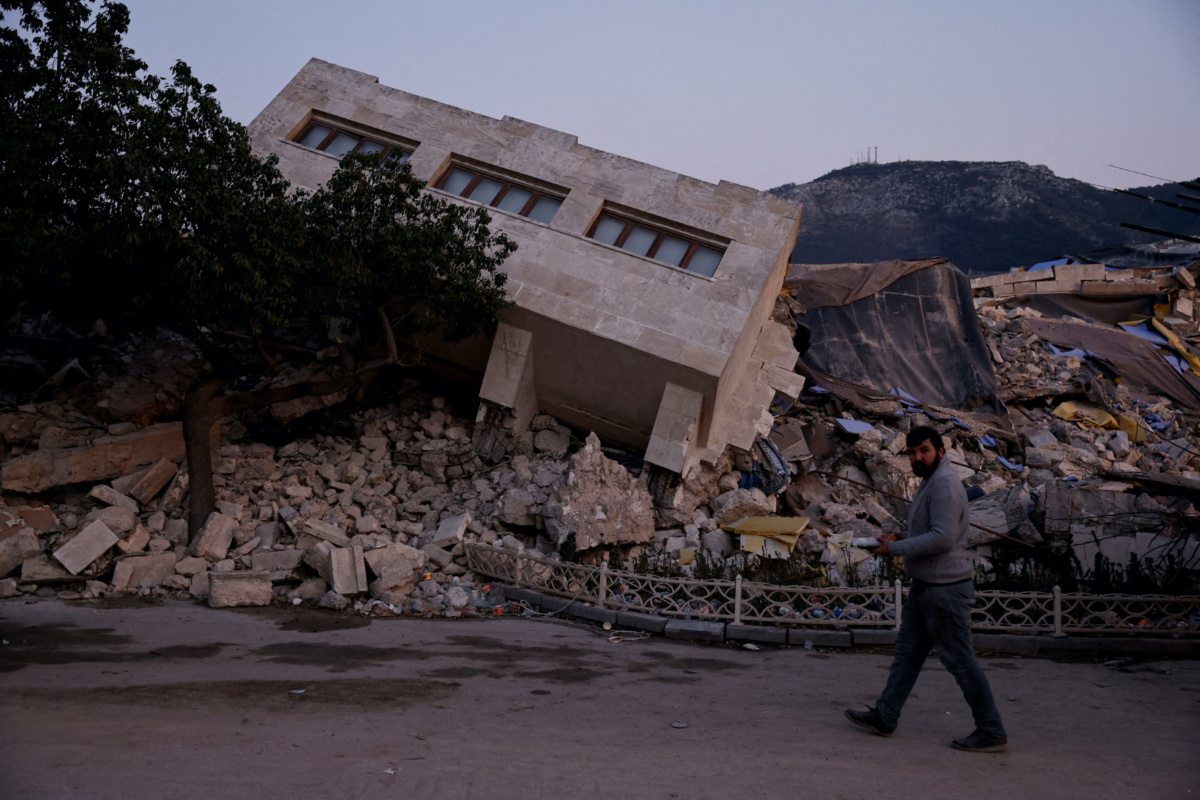Cilvegozu, Turkey
Reuters
Around 40,000 Syrians who had fled areas affected by the deadly 6th February earthquake have returned from Turkey to rebel-held north-western Syria in the two weeks since Turkey eased restrictions on their movements, a Turkish official and a Syrian rebel official said.
The immigration was recorded at four border crossings held by Syrian armed groups opposed to Syrian President Bashar Al-Assad, Mazen Alloush, a media officer at the rebel-held Bab Al-Hawa border crossing with Turkey, told Reuters.

A man walks by a collapsed building and rubble, in the aftermath of a deadly earthquake, in Antakya, Hatay province, Turkey, on 21st February, 2023. PICTURE: Reuters/Clodagh Kilcoyne/File photo
WHO’S TEDROS PLEDGES SUPPORT AFTER FIRST VISIT TO TURKEY’S QUAKE ZONE
The World Health Organization will support Ankara in its response to massive earthquakes that killed more than 50,000, Director-General Tedros Adhanom Ghebreyesus said on Tuesday, as the death toll from the latest aftershock rose to two.
The massive earthquakes that struck Turkey’s south-east and neighbouring Syria in the last three weeks have injured more than 108,000 in Turkey, leaving millions sheltering in tents or seeking to move to other cities.
The latest substantial aftershock, with a magnitude of 5.6, hit on Monday, killing two and injuring 140 people, the Disaster and Emergency Management Authority (AFAD) said, adding that 32 people had been rescued from the rubble.
Turkey is “doing its best” but still needs international support to help the victims of the earthquake, Tedros said, describing the destruction as “really massive” for modern history.
In a news conference alongside Turkish Health Minister Fahrettin Koca in Antakya, one of the most affected cities, Tedros said the two had discussed the health situation in camps.
“These are like respiratory infections, GI infections, especially mental health problems – because many people are really traumatized – and people who need rehabilitation services, especially orthopaedic service,” he said.
“From WHO side, we will support in any way possible based on the issues observed or documented and based on the priorities of the ministry,” Tedros added.
More than 160,000 buildings containing 520,000 apartments collapsed or were severely damaged in Turkey by the disaster, the worst in the country’s modern history.
President Tayyip Erdogan has pledged to rebuild homes within a year but it will still be many months before thousands can leave tents or shipping containers and daily queues for food and move into permanent housing, key to gaining the sense ofnormalcy and safety they lost.
The earthquakes have struck months ahead of presidential and parliamentary elections, scheduled to be held by June, which present the biggest political challenge to Erdogan in his two-decade rule.
– TIMOUR AZHARI, Adana, Turkey; Additional reporting by HUMEYRA PAMUK, BIRSEN ALTAYLI and ALI KUCUKGOCMEN/Reuters
As of Monday, some 13,500 had crossed through Bab Al-Hawa, nearly 10,000 through Jarabulus crossing and around 7,000 each through the Bab Al-Salam and Tal Abiad crossings, according to a table of statistics Alloush provided.
A Turkish defence ministry official confirmed that the number of Syrians who had returned to their country reached 40,000 as of Monday. More Syrians were returning and the number was increasing daily, the official added.
Restrictions put in place by Turkey in April last year, just before the Eid al Fitr holiday, had banned Syrians with temporary protection permits from making round-trips to Syria in an effort promote one-way returns.
Turkey hosts some 3.5 million Syrian refugees and anti-refugee sentiment has been on the rise in recent years.
In the aftermath of the quake, Syrians have taken advantage of an offer from Turkish authorities to spend up to six months in the northwest without losing the chance to return.
Many have gone back to check on relatives following the temblor that killed more than 44,000 people in Turkey and around 6,000 in Syria, most of them in the country’s rebel-held northwest, according to the UN.
Others have temporarily moved in with relatives after their homes and businesses in Turkey were destroyed in the quake.
“The plan is to go see our relatives and get out of this difficult atmosphere here,” said Khaled al-Ahmed, a Syrian labourer in his mid-50s who had been living in Kahramanmaras, one of the worse-hit areas.
He and his 10 children were waiting to proceed past the Turkish side of the Bab al-Hawa crossing at the weekend, the first time they would return to Syria since leaving as refugees eight years earlier. His home had been heavily damaged and work stopped, he said.
“People are going without knowing where they are heading, they just want to get out of here for now,” he said, adding he would seek to return to Turkey in one or two months.
Around four million people live in north-west Syria, with most of them dependent on aid even before the latest disaster, according to the UN.
– Additional reporting by HUSEYIN HAYATSEVER in Ankara, Turkey






